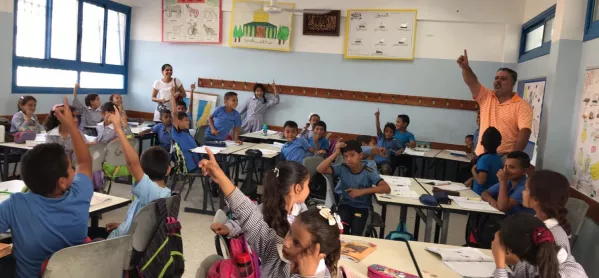How to empower students to take environmental action

Whether we live by the River Thames or the River Jordan, we all have a duty to care for the world’s water and the life within it.
We are connected to each other by the rivers of the world, and schools around the world are working together in a series of partnerships, supported by the British Council and Thames Festival Trust, to help young people in six countries take action and turn the tide on plastic pollution in our waters.
Young people from six schools in Dagenham and six schools in Palestine joined forces for an art-based collaboration, which has seen knowledge, creativity and inspiration flow between them.
Pupils were taught about the great rivers around them, how plastic pollution puts them in peril, and how they can use creativity to take a stand.
Pupils helping to protect our rivers
“The Rivers of the World project has opened pupils’ eyes to plastic pollution and how much of a global issue it is,” says Amy Whiley, an English teacher at All Saints Catholic School in Dagenham.
“They have learned how the simple changes they can make in their everyday lives have a massive impact in the future. During the project they were asked to make pledges to reduce plastic pollution, and many have kept to these.”
After being taught about the science of plastic pollution, Whiley explains, students from the six UK schools flexed their creative muscles by creating a series of sculptures, boosting both teamwork and communication skills. Working with a limited range of recycled materials also supercharged their problem-solving.
The students also came together to use their newly-gained knowledge to write a letter to the government about the issues of plastic pollution in their local areas, and how these could be addressed.
Caring for our water together
In its second year, the project was awarded a grant from Connecting Classrooms through Global Learning (funded by the British Council and the Foreign, Commonwealth and Development Office) so teachers in the UK and Palestine could visit their counterparts abroad.
During a trip to Palestine, UK teachers were impressed to see the creative plastic recycling approach, with students making flowers and small sculptures from plastic, creating plates from old CDs, and even creating garden items from what would have been rubbish.
They also watched theatre, dance and art performances by students, bringing the issue to life.
On the return visit, the Palestinian teachers were treated to a celebration evening of dance performances and traditional Palestinian music, as well as an exhibition of the large sculptures created by students from the Dagenham schools working together.
“To continue our collaboration, students from the Palestinian schools and the UK schools have written letters to each other to build on our connection,” Whiley continues. “We hope to continue this long into the future. The opportunity has given pupils the chance to establish connections across the globe.
“It has also improved students’ interaction, teamwork and confidence skills. It has opened their eyes to plastic pollution and how this is a global issue that affects us all. They have learned how simple changes they make can have a massive impact on others and the world around us.”
An SOS for the oceans
The eTwinning programme is the online community for schools across Europe and is co-funded by the Erasmus+ programme of the European Commission and managed by the British Council in the UK.
The programme has also brought together four schools for children with SEND from across the globe. Young people from the schools in the UK, Greece and Cyprus united to learn about the health of the world’s oceans.
Pupils shared opinions, experiences and ideas via the eTwinning online forum, exploring ways to help friends and family take action for a cleaner, brighter world. Then they opted to write, perform in and record their own film.
“Once the draft plot line of the movie was in place, we communicated with our partners through video calls so that all pupils could choose their roles and make their own costumes or props,” explains Maria Preftitsi, an expressive arts teacher at The Brook school in Haringey.
“Some of the filming took place in Greece, with one of the UK partner teachers visiting our Greek collaborators in Athens. During this visit, underwater filming took place at the Greek island of Aegina and pupils cleared a whole beach of plastic waste.”
As well as creating their own costumes and props from recycled plastic, they made a huge variety of displays, musical instruments, Christmas cards and decorations to sell for charity. By inviting other schools to view their film and read their blog posts, pupils were also able to raise awareness and inspire other young people and teachers to give up single-use plastics.
Inspired by their mission, The Brook pupils have insisted on having reusable bottles in school, using containers instead of plastic wrapping, drinking from paper straws and replacing plastic bags with fabric bags. In Cyprus, students visited their town hall and informed the mayor about their project.
Maureen Duncan, headteacher of The Brook, says: “Our Oceans SOS project has been inspiring. It has given our pupils opportunities to have their voice heard on important issues and to be agents for change. It has given them every reason to believe that the world is their oyster.”
Ettie Bailey-King is a freelance writer
For support with getting started in global learning, free classroom resources, information on training and funding for partnership activities, please check out Connecting Classrooms through Global Learning. The eTwinning programme is the online community for schools across Europe. eTwinning is co-funded by the Erasmus+ programme of the European Commission and is managed by the British Council in the UK
